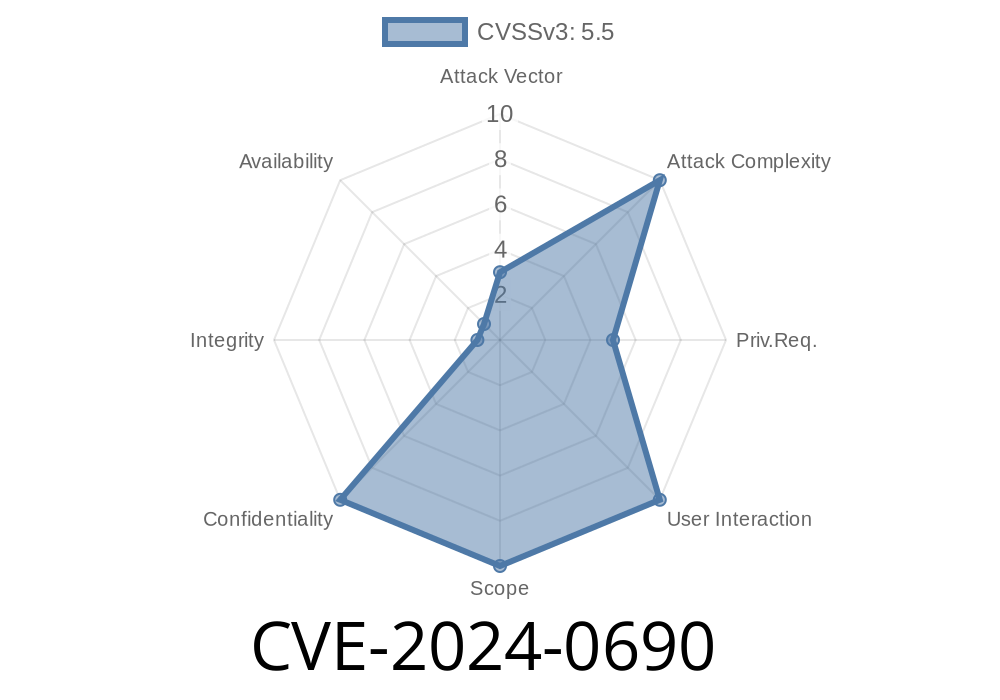Recently, a new security vulnerability was discovered in ansible-core, designated as CVE-2024-0690, which affects a wide range of systems. The vulnerability is an information disclosure flaw caused by the failure of ansible-core to respect the ANSIBLE_NO_LOG environment variable configuration in some scenarios. This can expose sensitive information, such as decrypted secret values, in the output of certain tasks like loop items. As a reminder, ansible-core is an automation tool that helps manage and configure servers, making it crucial to be secure.
This post discusses the details of the vulnerability, including how it occurs, code snippets that demonstrate the issue, relevant links to the original references, and possible exploit scenarios.
Vulnerability Details
The ANSIBLE_NO_LOG environment variable is used as a security feature in ansible-core. When set to "True," it is supposed to prevent sensitive information from being logged and displayed in the output of ansible-core's executed tasks. However, due to a failure in respecting this configuration in certain scenarios, sensitive information is still included in the output, breaching the security of the system.
The vulnerability was introduced when ansible-core failed to properly handle the ANSIBLE_NO_LOG environment variable in certain loop scenarios. In these situations, even if ANSIBLE_NO_LOG is enabled, the sensitive data is still logged in an exposed manner.
To illustrate the issue, here's a simple code snippet that demonstrates how this problem occurs
- name: Example Playbook
hosts: all
tasks:
- name: Sensitive secret loop
include_vars: secrets.yml
- name: Use the secret value in looping
debug:
var: item
loop: "{{ my_secrets }}"
In the above example, we assume that secrets.yml contains sensitive data that we wish to use in the subsequent tasks. Earlier, we enable the ANSIBLE_NO_LOG environment variable to prevent the sensitive data from being logged. However, due to the vulnerability, the debug output still includes the sensitive data contained in my_secrets variable.
For more information on this vulnerability, you can refer to the following sources
- Ansible Security Update
- CVE-2024-0690 - National Vulnerability Database
Exploit Scenarios
Exploitation of this vulnerability relies on an attacker being able to access the output logs of an ansible-core instance. If the attacker has access to these logs, they may extract sensitive information and use it for malicious purposes.
For instance, let's assume we have a deployment where ansible-core is used to configure a server with sensitive API keys, stored in a vault like HashiCorp Vault. When running the ansible tasks, the ANSIBLE_NO_LOG environment variable is enabled to prevent the logging of sensitive information. However, due to the vulnerability, the API keys are still exposed in the output logs, allowing an attacker with access to these logs to leverage the keys for unauthorized access to the API resources.
To mitigate the impact of this vulnerability, implement the following
1. Upgrade ansible-core to the latest version containing the fix for this vulnerability. Check for updates and refer to the release notes for more information.
2. Limit access to the output logs of ansible-core executions and store them in a secure location. Additionally, ensure that proper access controls are in place for users who can view the logs and execute ansible tasks.
3. Keep abreast of ansible-core security updates and follow best practices for secure configuration and deployment of ansible-core.
Conclusion
CVE-2024-0690 highlights the importance of monitoring and securing your ansible-core deployment as well as being vigilant in keeping your software up-to-date. Regular monitoring of security updates and adhering to best practices can help you keep your systems secure from potential vulnerabilities.
Timeline
Published on: 02/06/2024 12:15:55 UTC
Last modified on: 03/25/2024 22:37:19 UTC
